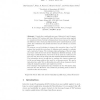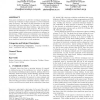23 search results - page 4 / 5 » On Avoiding Redundancy in Inductive Logic Programming |
ILP
2007
Springer
14 years 1 months ago
2007
Springer
Abstract. Despite the considerable success of Inductive Logic Programming, deployed ILP systems still have efficiency problems when applied to complex problems. Several techniques ...
JASIS
2000
13 years 7 months ago
2000
s In data mining, we emphasize the need for learning from huge, incomplete and imperfect data sets (Fayyad et al. 1996, Frawley et al. 1991, Piatetsky-Shapiro and Frawley, 1991). T...
VEE
2005
ACM
14 years 27 days ago
2005
ACM
Language mechanisms deserve language implementation effort. While this maxim has led to sophisticated support for language features specific to object-oriented, functional and lo...
PPDP
2004
Springer
14 years 21 days ago
2004
Springer
Semi-naive evaluation is an effective technique employed in bottom-up evaluation of logic programs to avoid redundant joins of answers. The impact of this technique on top-down e...
POPL
2010
ACM
14 years 4 months ago
2010
ACM
This paper introduces a new recursion principle for inductive data modulo -equivalence of bound names. It makes use of Oderskystyle local names when recursing over bound names. It...


